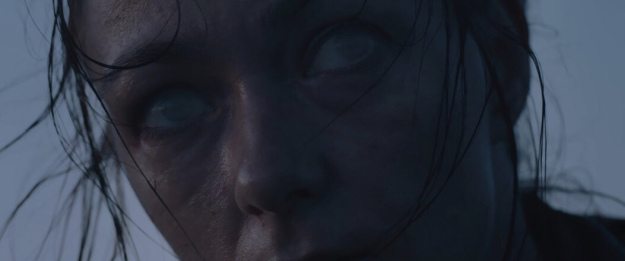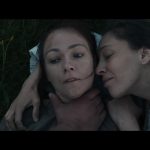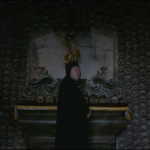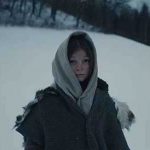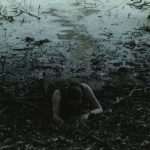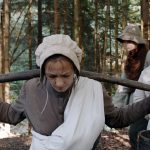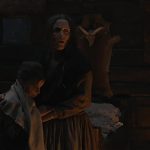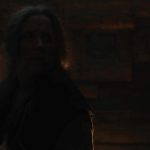Hagazussa: A Heathen’s Curse, 2018
Hagazussa
A Heathen's Curse
Images

Deutsche Film- und Fernsehakademie Berlin
“(They must be) of those who don’t carry God in their hearts. The Jews and the heathens. They come in the night and like animals they take you. And then some months later you bear a child.” – Swinda (Tanja Petrovsky)
I guess I’m getting too old for this kind of horror. Horror that transcends all genre conventions and presents itself to the viewers as being existentially sinister and advocating evil. It has been a crazy ride since my foray into the madness began, with films like Salò, or The 120 Days of Sodom, 1976; Begotten ,1989; Aftermath, 1994; Ex-Drummer, 2007; The Death King (Der Todesking), 1990 among other such unholy, outrageous and purely depraved ventures into the abysmally non-theistic films. Films (heh) where I watch and dissect extreme cinema, the cinema verite, where the filmmakers do away with artificial or artistic embellishment and present to us their imagining of a particular subject without restraint or studio interference. The latter is to cater to a niche market, however, once you enter there is no turning back. Thus making the films inaccessible and isolated to acquire an upper-class appeal; the highbrow are the influencers and the common man (you and I) is rebelling against the alternative possibility. It is here that the filmmakers become just that, a true art form or perhaps they try and tag their films such, for more people to gain a fascination with the allure of singularity. This results in either a no show or being bestowed upon titles such as “Best Films I Know No One’s Watching”, at various film-based websites. This results in lesser revenue, much less than what the pattern generates, but it does get itself included within the category of Prestige Horror, and might just earn itself good money in the long run. Well, we have plenty a films to earn their makers a decent buck, and nothing wrong with that; to earn a buck, a pretty seven-digit buck; and the new-age has shown us a phenomenal rise in ticket sales and subsequently the number is then in nine digits, easy. Avengers Infinity War and Endgame raked in a whopping $2.8 billion with their superhero spectacle(s). A small underdeveloped state can transform and amend its classification with that much money. Not implying that it should, just stating that it can.
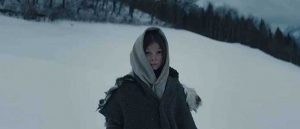
Celina Peter as Young Albrun
However, coming back to the film, despite not wanting to with a full heart, because I know; past inclinations have shown certain horror outings to be detrimental for this sinnerman, who is pushed further into a corner of despair and dark despondent thoughts; thoughts that brand themselves upon the brain and make the anti-depressants work less effectively. Yet I watch, letting the film assault my senses, for it certainly may have an unfavorable effect but a part of me has a deep, not so hidden veneration (yes, veneration) for exactly this sort of cinema where the senses are crippled by the repeated battery, the regressive maturation of extremely hard to consume visuals and the way they are being presented to the avid gorehound. But that’s the thing. It’s not the hyper-violence that gets to me, if that were the case the films of Takashi Miike and Park Chan-wook (among others) would have become a ‘no-go’ area a long time back – no, it’s not the gore. It’s the godlessness of a certain project, presented in style and chic sophistication. Take The Witch for example. A grand achievement in filmmaking. complete to the stylized shots and sequences and the painstakingly researched period dialogue, which adds to the conviction of persuasion of a very divergent kind.

Hagazussa: A Heathen’s Curse is one of the films whose likeness and categorization has been touched upon, briefly, in the above paragraphs. The film is being called “(a) spellbinding audiovisual symphony” by The Hollywood Reporter and “Mind-blowingly Creepy” by Cineuropa. Well, this sinnerman thinks it is so much more, with its foreign tongue (Middle High German spoken in old high German’ and Judeo-German, the precursor of the Yiddish language and scenes of a seemingly harmless goat farmer with awkward expressions on her kind face. She smiles sheepishly, takes care of her newborn, takes fresh milk to the townspeople (and gets bullied by the kids who know her as the woman who lives all alone in a cottage high in the snowy, misty mountains). Her reactions are misleading and she lacks the confidence compared to the mischievous lady she has befriended, Swinda (Tanja Petrovsky).
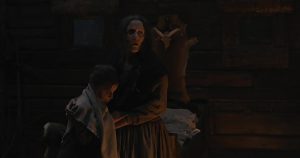
Martha (Claudia Martini) and young Albrun
Albrun” – Martha
The film begins with everything covered in white and children, the most sensitive subject of all. Like how Lars von Trier’s unbridled and unrestrained preface for Antichrist, 2009 unveils. Children sledding on the snow-filled mountains, with one of the kids seemingly isolated from the group. The shots of smoky stygian mountain forestation coupled with the ominous score from the Greek dark ambient duo MMMD; which sounds as if an electric guitar string was plucked for soundcheck and the reverberation the amplifier feedback causes that goes on forever. It is as if the baleful note is stuck in a maddening cycle, the volume rising and then lowering as the scenes require it to be. From there to seclusion, isolation, dark, pulsating with trepidation dark of a solitary cabin in the woods – the Gothic set design contributes significantly to the horror of Hagazussa, for it is is in the same cottage that we witness evil incarnate and not all of it at once. It starts calculatedly, with Albrun as a child (Celina Peter as Young Albrun), seemingly afraid and baffled by the circumstantial sardonic disdain. She approaches her mother, Martha (the mother), who is afflicted by a strange ailment and keeps whispering to herself and no matter how hard the viewer tries to listen, the words cannot be made sense of, adding to the unease and disquiet building in the hearts and minds of those who thought they could handle the truth; truth in a manner of regressive countenance, mangled and distorted and waiting to rid, to foll by of the thin veneer of false equanimity and to embrace the dark and sinister of the infernal and tenebrous but an assured narrative that transforms the keen viewer to extreme foreboding and anxiety. And much like the blockbuster, which garnered hate and love in equal proportions (“You will [bleed]”).”, the name Martha is a moot point here also, but with the sinister cranked up to a 100.
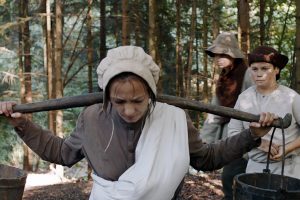
The town bullies
This is a directorial debut for Lukas Feigelfeld (Beton, 2011), whose film is a slow burn with a stylized and unmitigated presentation, with a silvery scream and polished chrome cinematography by Mariel Baqueiro) of the supernatural, which gives way to full-blown tangible, severe disgust and depressive loathing. The brooding terror, once it starts, never gives up, rather, the stunning visuals of the steep snowy mountains always covered in a thick mist draw the viewers closer to the narrative; even better to scare up close and personal. The film gets under the skin, making it a scornful experience that must be consumed whole. Hagazussa does not offer immediate gratification to shock scares, since there aren’t any (unless you count the acid trip gone horribly wrong), instead, it builds on the portentous, making the visuals highly absorbing and twice as deranged; magnificently and gorgeously mad and maddening and of an unsound mind, a mind that weaves evil filaments, fueling the narrative with pristine malevolent and ever so potently flagitious. The newborn refuses her mother’s milk, alluding to “the refusal of feeds in the days leading up to or during their mother’s menstrual period or when she is ovulating” (the sexuality of young Albrun is exploited to the fullest and not all is sensitive nor considerate to the fairer sex. The director is hinting at (since the title flashed on the screen) hormonal changes, affecting breast milk. The poetical, nauseous, and dream-like, unreal state of the deteriorating mind will appeal more to the art-house friendly viewers and it will push away the fans of mainstream horror, push them far off, for you see Hagazussa is quite clear in who it wants to show what it wants to show, the rest can go diving in a pool of murky water.

Hagazussa is unforgiving, visceral, intuitive, unkind, harsh, raw, muted, bewitching; this picture is so wrong to have been made and also to consume – sometimes it begins to smell bad, for fuck’s sake.
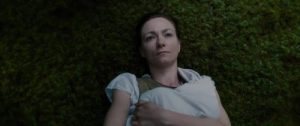
Hagazussa – Der Hexenfluch
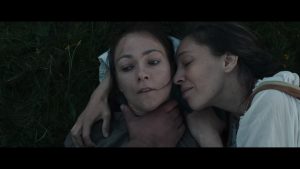
It’s disgusting how you all smell, your rotten stench.”
– Swinda
The wide-eyed and paranoid and intense performance of Aleksandra Cwen is most praiseworthy as the consigned to oblivion child of a very bad woman (this is quite open-ended like the rest of the grueling film), and – again – not for those seeking a quick horror fix. No, not at all. It takes it rotten sweet time to build and then to tread and balance the perilous path of first becoming a victim and then the full-blown transformation into something that is better off to not speak of or to write about. Forget dissecting; one look at the mutilated body of the goat with the innards spilling out at the slightest touch and you know that Feigelfeld and his team have taken care of all the vivisection it requires. It all pullulates from telling the sad and forlorn tale of isolation, trauma, maltreatment of a mentally delusional person, who is driven to do what she does as a simple matter of gaining revenge against herself, what she has become or is becoming; a product a construct of the society; and those responsible for tricking her into thinking that she has become acceptable among the townsfolk, the same bunch of people that made a pariah of the lady who lives alone, all by herself in a secluded, jerkwater cottage at the top of a scenic mountain top, surrounded by a thick forest where very evil things happen as the sun settles and even in the full light of day. As per Feigelfeld,
The film tries to depict a very personal and empathetic mental image of a nightmarish and sick mind.”
– Feigelfeld
And does it entirely succeeds at doing what it started out to accomplish? We do end up feeling sorry for the woman in the woods.
In order to acquire a mere glimpse (at first) of the dark; of pristine evil, our damsel in abject distress must relieve herself of faith, in a water supply reservoir, buffers of hollow tree logs between downstream rivers and urban water supply networks, one of which that supplies water to the town is shown earlier in the film and later connected to the wrath of Albrun, which she unleashes on the townsfolk.
Now, if thought of in retrospect, it is what the town bullies have invited upon themselves, however, the way revenge is meted is plain old evil incarnate, nothing less, nothing more. But the viewer is caught in a quandary of sorts, having watched Albrun as a kid of perhaps twelve, thirteen. A beautiful, innocent-looking kid with an eccentric and diseased mother and heading towards a full-blown psychosis, projected with an outrage of bubonic proportions. Harassment that leads to disorder and a hallucinogenic psychosis, a stagnant pond, mushroom growth with maggots writhing on them. And then she picks one up and puts it into her mouth, maggots and all.

To strengthen the faith of a religious community, it requires all sacrilege be cleansed.”
– Haymon Maria Buttinger as the Dorfp farrer
Hollywood’s favorite sacrilegious lighthouse keeper, Robert Eggers (The VVitch), finally has competition in the form of the precise vision of someone who is equally Gothic-badass like him, Lukas Feigelfeld has made a creepy as hell and a highly irreverent horror film, which belongs to the prestige-horror genre in all essence and wrapped in an upscale packaging, imported all the way from Germany.
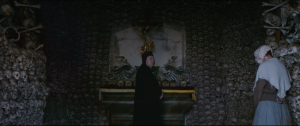
The local church is an ossuary
The heretical, derisive, spine-chilling, yellowing at the edges motion picture is, among other things, polished yet rough at the edges and an orchestration of puritanical repression of Catholic proportions, that and a definitive study in isolation and embracing the dark and evil, and the dark of evil with certain inverse religiosity and fervor and devoutness.
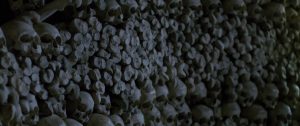
This film shook me up from the inside and no matter how hard I tried to shift my glance away from the scenes, the breathtaking static shots and symmetrical framing, much like Wes Anderson‘s filming technique, quirk kept bringing me back to the diabolical hearsay of Hagazussa.
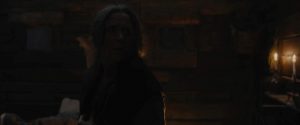
This one’s gonna take a bottle or two to shrug off, that and some happy pills and maybe a choke on that Panama red.
Damn this is hard to watch and this mountain goa… er, man has watched some nasty, dirty, ugly, sinful shit.

Proceed with extreme prejudice and not at all for the faint of heart.

